5 Reasons Why Being a Field Coordinator Is Awesome
Being a field coordinator is a difficult, but incredibly rewarding job and we always come to treasure the unique and life-changing experiences we have during our time in the field. To give you some insight into what this job is like, here are the five best things about it.

Getting to know the refugees
This is by far the most amazing part of what we do. When refugees come under our care, we form strong bonds with them. Despite the vastly different stories and personalities, through our conversations, we see the common thread of remarkable perseverance and will to survive in each of the North Koreans we rescue. All of them have hopes for the future and many of the things we learn about our friends can be emotional, further strengthening our bond. We focus so much of our energy on providing food, clothes, shelter, time to rest for these refugees who have been through so much. When it comes time for them to leave, they do so with so much gratitude and strength. We believe getting to know them creates a strong relationship between the refugees and LiNK so that they feel comfortable reaching out for additional services after resettlement.

Seeing how refugees have changed post-resettlement
In Southeast Asia, the North Korean refugees we assist are still en route to their resettlement destination and are still not completely at peace. They are often nervous, anxious, and trying to process being in a world completely unfamiliar to them.
When we have the opportunity to travel to South Korea to meet with them once they have resettled, it’s always gives us a rush of anticipation because we get to see how they have changed. One particular memory we have from one of these trips is of visiting a noraebang (a Korean karaoke room) with resettled refugees. To watch them having fun was very moving. Sometimes, the simple fact that they look happy and safe is more than enough to make this job worth it.
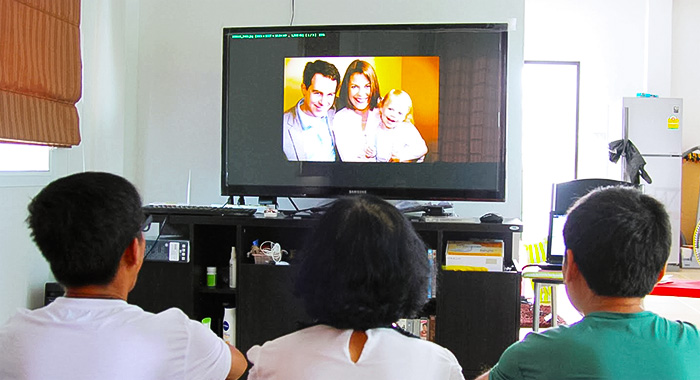
Introducing refugees to the supporters who funded their rescues
The concept of a complete stranger donating several thousand dollars to a person in need they have never met is a completely foreign concept to many North Koreans. They are often astounded and moved that a person thousands of miles away would do something so selfless. With each refugee that comes through, we always make sure to introduce them to the person or group that helped fund their rescue, explaining who they are, where they’re from, how they found out about North Korea, and why they donated. It’s a moment when two worlds meet and the refugees often write thank you cards to donors to express their gratitude.

Observing how refugees interact with technology
It’s interesting to observe how sudden exposure to a world of technology affects a person who hasn’t grown up with it. One middle-aged refugee was hesitant about taking a photo with his head turned to the side because he thought the North Korean government had the technology to turn heads in photos and thus find out his identity. In contrast, we have also seen a North Korean child begging his mom as soon as the group arrived to turn on the TV so he could watch cartoons. The family had been well-off enough to be able to expose their son to foreign media at a young age even inside North Korea.
It’s a fascinating experience to show refugees Google Maps views of their hometowns. It’s just a simple bird's eye view, but the way their eyes light up and their fingers trace the roads to their homes, circle their schools, train stations, and marketplaces, is so visceral for them. It’s a contemplative moment for us—these people have left their country because of reasons that made life in North Korea miserable or unlivable. Despite that, North Korea is HOME and still filled with memories, both good and bad, of their childhood, family, and the simple pleasures of life—chatting with neighbors, holiday memories of gifts and special foods, and weddings.

Breaking the ice with delicious food
The first meal with every group is always quiet because we’re all meeting each other for the first time. So we always make it a point to ask about special foods the refugees had in North Korea or on the journey down as an icebreaker. Afterall, who doesn’t love talking about food? It’s true for North Koreans as well - everyone loves giving input on regional differences in preparing holiday meals, comparing market prices on fruit and produce, or complaining about the food not matching their tastes on their journey down.
We want to make sure the North Korean refugees are able to eat as much as they can to be strong enough for the remainder of their journey so we’ve made it a point to find out what foods fit best with their palates. For many of them, this journey is the first time they’ll have experience some tastes or seasonings (like cilantro) and it can come as a shock to them. It’s fun to think about what foods they would like—Yogurt? Chinese-style buns? Noodle soup? Fried rice with a fried egg on top is an all-around crowd pleaser.
Soon after the first meal, the refugees will have lively discussions about the delicious foods they ate in North Korea and when they were available. One mission, we brought out persimmons as dessert—it initiated a 20-minute discussion on the merits and differences of persimmons eaten in North Korea versus the ones bought in Southeast Asia.
Being a field coordinator is filled with many unique moments and this list summarizes just a few of them. And yes, though it is challenging at times, it’s the refugees who we are most excited to serve. We love sharing our experiences with them. No one group or mission is the same and that keeps our job exciting, varied, and dynamic.
Want to be our team in the field? Apply to be our next field coordinator!
Apply Now!
Chuseok for North Koreans | No Way Home for the Holidays
Autumn is a significant season for many people and cultures around the world. It’s a period of transition and reflection, gratitude for the days gone by, and celebration of the harvest.
In both North and South Korea, this time of year is celebrated with Chuseok, or the mid-autumn festival. Also known as “Korean Thanksgiving,” it’s a major holiday that predates the division of the peninsula. Chuseok is observed on the 15th day of the 8th month of the lunar calendar, when the harvest moon shines brightest. Traditionally, people return to their ancestral hometowns to gather with family, share a variety of delicious foods, and pay respects to their ancestors.
But for North Korean refugees, there is no going back. Holidays like Chuseok can be a bittersweet time, one of both gratitude for a life in freedom and grief over being unable to celebrate with family still inside North Korea.
“The first Chuseok in the US felt very empty and lonely. It was just me and my two-year-old daughter, Mia, back then. It didn’t feel like a holiday. I had multiple emotions at the same time. Loneliness, emptiness… there were so many feelings that I couldn’t even put into words.“
– Holly, escaped North Korea in 2013
Chuseok celebrations have evolved to look a little different in North versus South Korea, and even in countries like the US where the Korean diaspora have resettled.
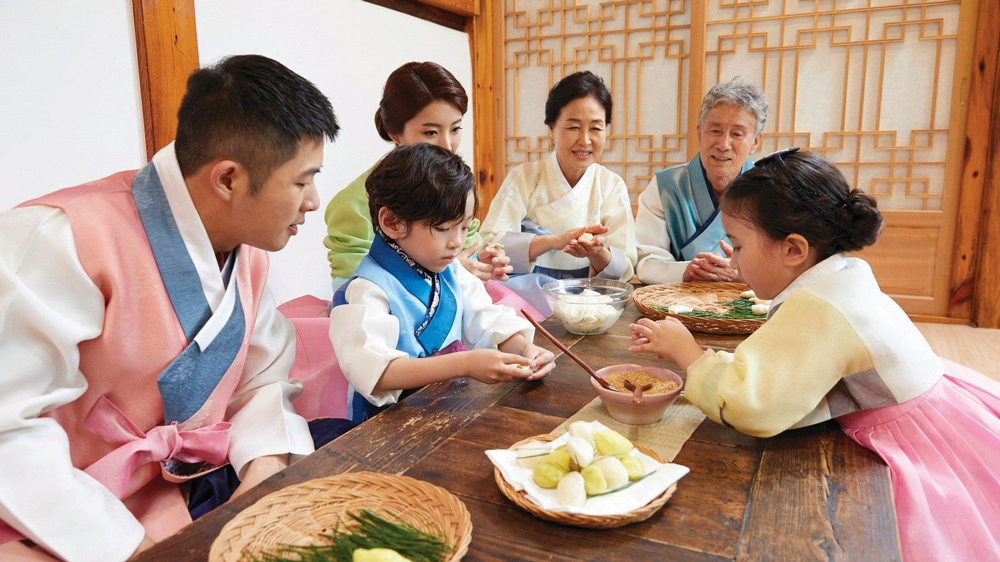
Chuseok Traditions in South Korea
In South Korea, Chuseok is considered the largest and most important holiday of the year. It’s celebrated over three days, during which a “national migration” takes place as people all over the country travel to their hometowns or to go sightseeing. Tickets for planes, trains, and buses are sold out months in advance, and freeways are packed with bumper-to-bumper traffic during the holiday period.
On the morning of Chuseok, families hold a memorial service for their ancestors at home, known as charye (차례). A table of food is prepared as an offering, typically featuring rice cakes, fresh fruits and vegetables, meat dishes, and the favorite meals of deceased loved ones. Families will also visit ancestral gravesites, a custom known as seongmyo (성묘), to pay their respects and tend to the graves.

From the ancestral table to large family meals, food is a central part of Chuseok celebrations. The defining dish of this holiday is seongpyeon (송편), a chewy, sweet, and nutty half-moon shaped rice cake steamed in fresh pine needles. It’s traditionally made with rice from the year’s harvest, finely milled into flour. Preparing seongpyon becomes a family activity as each piece is shaped by hand and filled with red bean paste, toasted sesame seeds, or chestnuts.
Other holiday foods include pajeon(파전), a crispy, savory pancake made with green onions; galbijjim (갈비찜), sweet and savory braised short ribs; and japchae(잡채), glass noodles stir-fried with meat and vegetables.
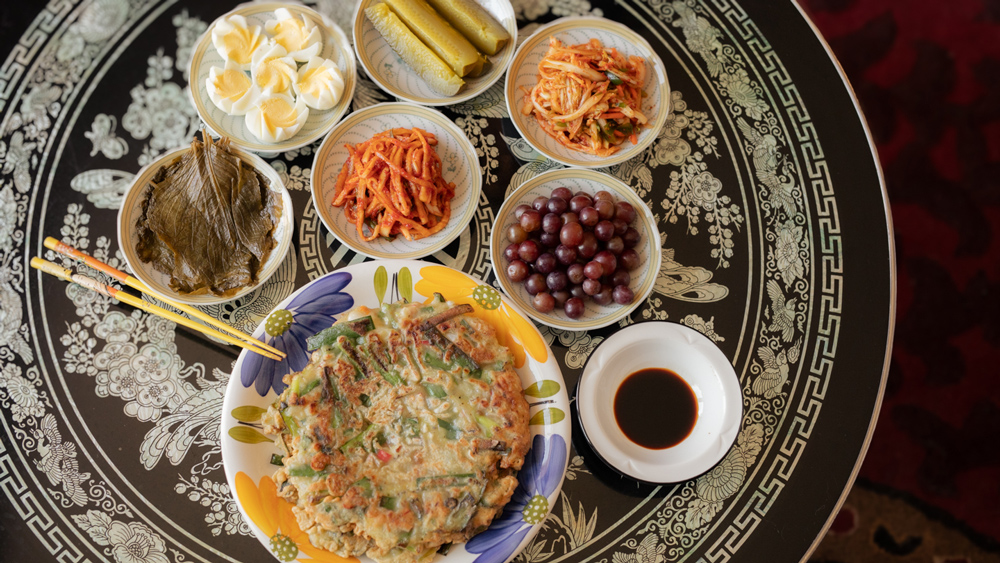
How Chuseok is Celebrated in North Korea
In North Korea, Chuseok is just a one-day celebration. While it is considered a key traditional holiday, its importance has been minimized relative to national holidays like the birthdays of Kim Il-sung and Kim Jong-il, and the anniversary of the founding of the Worker’s Party.
On both traditional and national holidays, North Koreans are urged to visit the statues of Kim family leaders or the Kumsan Palace of the Sun in Pyongyang, where the bodies of Kim Il-sung and Kim Jong-il lie.
It is much less common for widespread travel to take place during Chuseok due to severe travel restrictions and poor transportation infrastructure. However, these constraints have also made it so that generations of North Koreans remain in close proximity to their hometowns and relatives. For Chuseok, people gather with their nearby family members. Just like in South Korea, they’ll prepare special foods as offerings for charye, and then visit ancestral grave sites to pay respects.
After ancestral rites, festivities become a community affair with traditional food and folk games shared amongst family, friends, and neighbors. Songpyeon is also a holiday staple, but the North Korean version is made with a minced meat and vegetable filling, and are twice as big as South Korean ones. Common folk games are yutnori (윷놀이), a board game, and ssireum (씨름), or Korean wrestling.
Holly & Mia: A Legacy of Freedom
It’s been over a decade since Holly left her hometown in North Korea. But whenever she makes pajeon (파전), it takes her right back to her childhood—sitting by the frying pan and watching her mom cook, eagerly awaiting a taste. “Pa”(파) means green onion and “jeon”(전) refers to foods that have been pan-fried or battered. There are many varieties of “jeon,” made with everything from potatoes to zucchini, seafood, kimchi, and more.
Holly saw her mom cook this dish countless times in North Korea. It was an inexpensive, everyday staple, but also an essential part of the holidays. Every year for Chuseok, the mouthwatering aroma of oil and batter would draw everyone to the kitchen, where a colorful assortment of jeon was being prepared.
Holly now lives halfway across the world from North Korea, but every year during Chuseok, she sets out an offering table for charye. For hours, she prepares foods like pajeon with great care, remembering and honoring her parents and loved ones, who she can’t be with for the holidays.

In 2016, Holly reached freedom through LiNK’s rescue networks with one-year-old Mia in her arms.
Mia is now at an age where she’s able to understand some of the things her mother went through. Holly has begun to open up more about her life in North Korea, and does her best to keep their small family connected to their Korean heritage. She takes Mia to Korean language school on Sundays, and makes an effort to celebrate cultural holidays, like Chuseok. What can’t be put into words, Holly communicates through food—their dinner table is always full of delicious Korean cooking.
In 2024, Holly received her US citizenship, nine years after her resettlement!
"When I obtained my US citizenship, it felt like my escape journey was finally complete. I cried and felt so grateful to the US for giving me a new life. My greatest happiness is seeing Mia have a childhood free of the painful hardships that defined mine.”
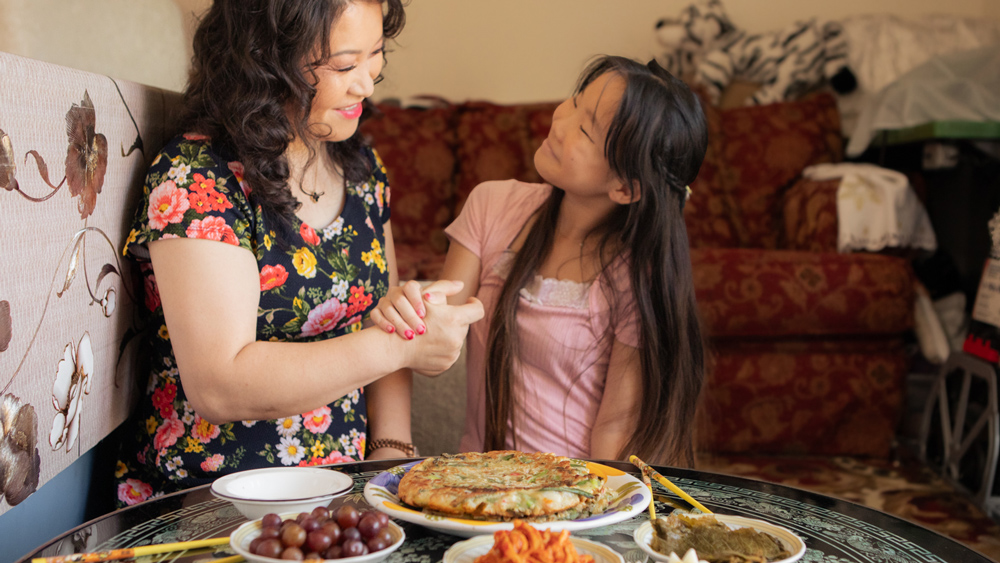
These days, Chuseok has become a lively gathering with the many friends and neighbors they’ve met over the years! Holly gathers with other Koreans in the community, and they go all-out preparing delicious seongpyeon and pajeon. She takes great pride in wearing traditional hanboks with Mia, and explaining each dish when guests arrive. The festivities always continue long after dinner, with Korean games like jegichagi, a version of hacky sack, and yutnori, a board game.
Living in the US, Holly and Mia have been introduced to new traditions too. Just a month after Chuseok, their community gathers again to celebrate Thanksgiving with turkey and pumpkin pie, in true American fashion.
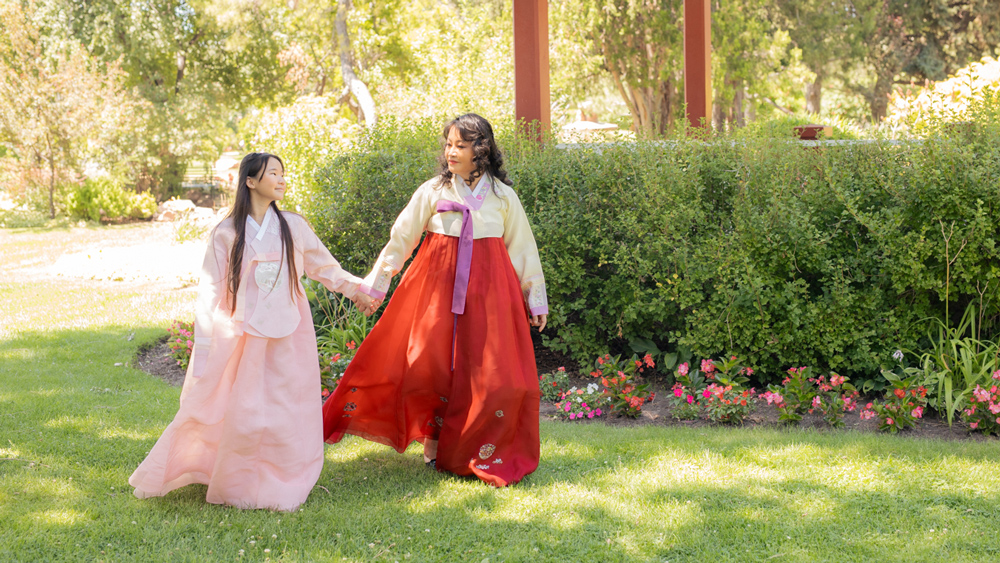
Holly still has hope that in her lifetime, she’ll be able to celebrate Chuseok with all her family and bring Mia to visit her hometown in North Korea.
We’re working towards the day when families don’t have to be separated. To date, LiNK has rescued almost 1400 North Korean refugees and their children, reuniting over 500 people with their families in freedom. As we’re helping North Koreans, like Holly, build new lives, we’re also leading initiatives to increase change inside North Korea, through advocacy, information access, and more.
Become a monthly donor and create a long-lasting legacy of freedom. Your support will rescue North Korean refugees waiting for their chance to escape right now, and fuel work that is increasing change and opening inside North Korea.




